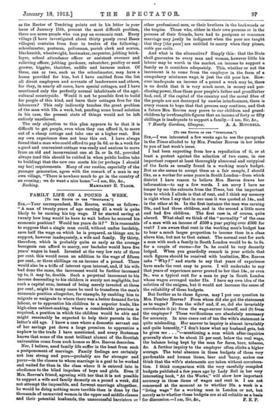FAMILY LIFE ON A POUND A WEEK. [To THZ EDITOR
OF TEM "SPECTATOR:] Sts,—Your correspondent, Mrs. Reeves, writes as follows: "A man of twenty years of age earning 21 a week is quite likely to be earning his top wage. If he started saving at twenty how long would he have to wait before he secured his economic position ? Would ten years do it " It is reasonable to suppose that a single man could, without undue hardship, save half the wage on which he is prepared, as things are, to support, however inadequately, a wife and family. By thirty, therefore, which is probably quite as early as the average bourgeois can afford to marry, our bachelor would have five years' wages in band. Invested at the very low rate of three per cent, this would mean an addition to the wage of fifteen per cent., or three shillings on an income of a pound. There would also be a trifle of interest upon interest, and, if his wife had done the same, the increment would be further increased up to, it may be, double. Such a perpetual increment to his income descending to his children is surely not negligible, but such a capital sum, instead of being merely invested at three per cent., might in many cases be used to transform the man's economic position altogether, for example, by enabling him to migrate or emigrate to where there was a better demand for his labour, or to apprentice his children to a superior trade, like high-class cabinet-making, where a considerable premium is required, a position in which the children would be able and might reasonably be expected to help their parents in the latter's old age. I know a case where a domestic servant out of her savings pat down a large premium to apprentice a nephew to the trade I have mentioned, and every Scotsman knows that some of the most brilliant alumni of the Scottish universities come from such homes as Mrs. Reeves describes.
Nor, I believe, need family life suffer in the least from such a postponement of marriage. Family feelings are certainly not less strong and pure—probably are far stronger and purer—in the classes to whom marriage is a goal to be worked and, waited for than in the class where it is entered into in obedience to the blind impulses of boys and girls. Even if Mrs. Reeves's friend, agreeing with her that it is not possible to support a wife and family decently on a pound a. week, did not attempt the impossible, and forwent marriage altogether, he would be doing nothing more terrible than is done by the thousands of unmarried women in the upper and middle classes and their potential husbands, the unsuccessful barristers or
other professional men, or their brothers in the backwoods or the tropics. Those who, either in their own persons or in the persons of their friends, have had to postpone or renounce marriage may justly be indignant when the poor are taught that they [the poor] are entitled to marry when they please, cazite que ealte.
And what is the alternative ? Simply this : that the State shall guarantee to every man and woman, however little his labour may be worth in the market, an income to support a family as it considers adequately. This, whether or not the increment is to come from the employer in the form of a compulsory minimum wage, is just the old poor law. However inadequate an income of a pound a week may be, there is no doubt that it is very much more, in money and purchasing power, than these poor people's father and grandfather had, and, if the capital of the country and the moral fibre of the people are not destroyed by unwise interferences, there is every reason to hope that that process may continue, and that a future Mrs. Reeves may prove to our children and grandchildren by irrefrangible figures that an income of forty or fifty shillings is inadequate to support a family.—I am, Sir, Sze., 7 Huntly Gardens, Glasgow. A. A. MITCHELL.






































 Previous page
Previous page